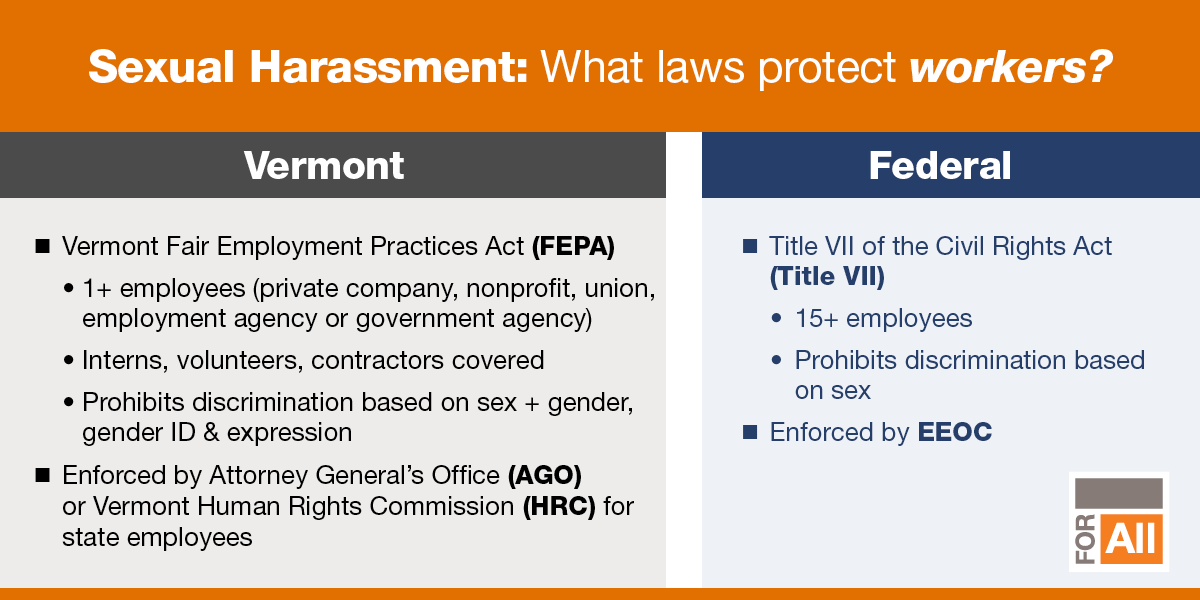Vermont’s Fair Employment Practices Act (FEPA) makes it an “unlawful employment practice” for an employer to discriminate against a person based on:
- Age
- Ancestry
- Color
- Crime Victim status (not recognized for protection under federal law)
- Disability
- Gender Identity
- Health insurance coverage status (not recognized for protection under federal law)
- HIV+ Status
- National Origin
- Place of Birth
- Race
- Religion
- Sex
- Sexual Orientation
- Association with a member of a legally protected category listed above
These are considered “legally protected categories.”
Who is an “employer” subject to FEPA?
Vermont’s discrimination prohibitions apply to all employers with one or more employees.
In most instances, the Vermont Fair Employment Protection Act mirrors federal protections under Title VII of the Civil Rights Act of 1964, the Americans with Disabilities Act, and other federal laws. However, Vermont law is broader than federal law and applies to all employers with one or more employees working in Vermont. An employer includes individuals, partnerships, labor organizations, government bodies, associations and organizations, and other businesses and agents doing business in the state. Labor unions and employment agencies are also prohibited from discrimination under FEPA.
What is unlawful discrimination?
State and federal laws recognize that discrimination is unlawful when people are:
- Treated unfairly in employment based on one or more legally protected categories, or
- Subject to illegal harassment at work, or
- Retaliated against for exercising their rights under workplace discrimination laws.
What kinds of employer actions or practices are prohibited?
Unfair or unfavorable treatment due to membership in any legally protected category is prohibited in any aspect of employment, including:
- Job advertisements, recruitment, and hiring
- Applications, interviews, and background checks
- Training, apprenticeships, referrals and assignments
- Promotion, performance management, discipline, and discharge
- Pay, benefits, and any other terms or condition of employment
- Requests for reasonable accommodations for employees in certain protected classes
Workplace harassment is a form of unlawful employment discrimination. Workplace harassment is unwelcome conduct based on membership in a protected category.
Harassment becomes unlawful if enduring offensive conduct in the workplace is a condition of continued employment or if the conduct creates a work environment that a reasonable person would consider intimidating, hostile, or abusive.
Retaliation against individuals who participate in protected activities related to a discrimination or other employment related complaint is unlawful.
An employer can discriminate through one or a series of decisions, individual conduct, or by systemic problems that result in disparate conditions for members of a protected category.
Intentional and unintentional discrimination
The law recognizes discrimination that is intentional or unintentional.
Intentional discrimination in employment happens when decisions are affected by:
- Actual animosity towards a person or group based on their race, ancestry, or other membership in a protected category (although a showing of animus or malice is not required under the law)
- Stereotypes about a person’s skills, abilities, personality, or other traits which are consciously held about people because of their sex, race, age, or other legally protected category
- Discriminatory preferences or biases of customers, coworkers, clients, or others in the workplace
Unintentional discrimination includes microaggressions, unconscious biases, and unconsciously held stereotypes. It can take the form of neutral policies or practices when they have a disproportionate impact on people in a protected class.
Stereotypes are generalizations or preconceptions about how members of an identity group should or should not act, feel, or present themselves. Stereotypes develop from ideas that oversimplify or generalize a group of people based on their race, class, gender, sexuality, age, ability, religious beliefs, practices, or other characteristics. Stereotypes tend to reflect cultural and individual conscious and unconscious biases, preferences, and prejudices. Stereotypes can range from harmful to seemingly benign, but still have negative effects, particularly in the workplace. Cultural stereotypes can limit how a person is perceived as a worker, team member, supervisor, and professional. They can affect employment opportunities, career advancement, career pursuits, and life choices.
The law prohibits employment actions or work environments that are affected by stereotypes, generalizations, assumptions, or biases about members of protected categories. Workers should not be treated unfairly or less favorably in employment due to their race, skin color, sex, sexual orientation, gender identity, age, disability, religion, national origin, ancestry, place of birth, or any other protected category.
Retaliation
Anyone involved in discrimination complaints and investigations should be free to make complaints, participate in interviews, oppose a claim, and provide information to investigators or public agencies without fear of reprisal by their employer. Despite prohibitions against employer retaliation, a sizeable portion of discrimination claims filed with public enforcement agencies each year include a retaliation claim.
Retaliation occurs when employers treat applicants, employees or former employees, or people closely associated with these individuals, less favorably because they engaged in legally protected activity related to a discrimination complaint.
Unlawful retaliation can occur against someone involved in complaint activity, even when the underlying conduct complained of did not constitute harassment or discrimination.
FEPA prohibits employers from discharging or discriminating against any employee because the employee:
- has opposed any act or practice that is prohibited under [FEPA];
- has lodged a complaint or has testified, assisted, or participated in any manner with the Attorney General, a State's Attorney, the Department of Labor, or the Human Rights Commission in an investigation of prohibited acts or practices;
- is known by the employer to be about to lodge a complaint, testify, assist, or participate in any manner in an investigation of prohibited acts or practices;
- has disclosed their wages or has inquired about or discussed the wages of other employees; or
- is believed by the employer to have acted as described above.
Exercising these rights is called "protected activity," and it can take many forms. “Protected activity” can include:
- filing or being a witness in a discrimination charge, complaint, investigation, or lawsuit
- communicating with a supervisor or manager about employment discrimination, including harassment
- answering questions during an employer investigation of alleged harassment
- refusing to follow orders that would result in discrimination
- resisting sexual advances, or intervening to protect others
- requesting accommodation of a disability or for a religious practice
- asking managers or co-workers about salary information to uncover potentially discriminatory wages, or
- other acts to oppose discrimination, as long as the employee was acting on a reasonable belief that something in the workplace may violate anti-discrimination laws, even if they did not use legal terminology to describe it.
Engaging in protected activity, however, does not shield an employee from all discipline or discharge. FEPA provides that employers may still discharge an employee for “good cause shown.” See 21 VSA 495(a)(8). Similarly, under federal law, employers can discipline or terminate workers, as long as they are motivated by non-retaliatory and non-discriminatory reasons that would otherwise result in such consequences.
Most importantly, an employer should not do anything in response to protected activity that would discourage someone from resisting or complaining about future discrimination.
Depending on the facts, if an employee has engaged in protected activity, an employer could commit unlawful retaliation if it then:
- reprimands the employee or gives a performance evaluation that is lower than it should be;
- transfers the employee to a less desirable position;
- engages in verbal or physical abuse;
- threatens to make, or makes reports to authorities (such as reporting immigration status or contacting the police);
- increases scrutiny;
- spreads false rumors, treats a family member negatively (for example, cancels a contract with the person's spouse); or
- makes the person's work more difficult (for example, punishing an employee for an EEO complaint by purposefully changing his or her work schedule to conflict with family responsibilities).
Managers should ensure that applicants, employees, and former employees are not punished for reporting possible discrimination, participating in a discrimination investigation or lawsuit, or opposing discrimination (for example, threatening to file a discrimination complaint).
See the EEOC’s more detailed explanation of what employee activities are protected from employer retaliation under federal law: https://www.eeoc.gov/laws/types/retaliation.cfm
Retaliation is not only illegal, itis also bad for business. It is in an employer’s best interest for employees to feel comfortable reporting discrimination, so that employers can investigate and address any conduct that violates the law or internal policies.
The EEOC recommends that employers help prevent retaliation by:
- Informing employees that retaliation is prohibited;
- Assuring employees that they will not be punished for taking actions that are protected by law;
- Responding to discrimination questions, concerns and complaints promptly and effectively;
- Ensuring that managers understand their responsibility to stop, address and prevent retaliation; and
- Holding employees accountable for complying with and enforcing discrimination rules and policies.


